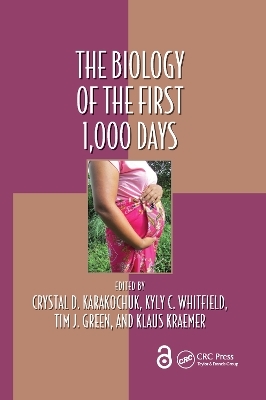
The Biology of the First 1,000 Days
CRC Press (Verlag)
978-0-367-65769-7 (ISBN)
The first 1,000 days, from conception to two years of age, is a critical period of growth and development. Exposures to dietary, environmental, hormonal, and other stressors during this window have been associated with an increased risk of poor health outcomes, some of which are irreversible. The book addresses this crucial interval of early life across biological disciplines, linking concepts related to all biological fields to outcomes during the first 1,000 days (e.g. fetal growth and pregnancy outcomes) and beyond (e.g. gut microbiome and cardiovascular disease later in life). The strength of this book lies in its cross-disciplinary nature.
Crystal D. Karakochuk, PhD, RD, is an assistant professor in the Department of Food, Nutrition, and Health at the University of British Columbia, and an investigator in Healthy Starts at BC Children’s Hospital, Vancouver, British Columbia, Canada. She has worked internationally as a nutritionist for the United Nations World Food Programme (Rwanda, Malawi, Ethiopia, and Rome) and UNICEF (New York and Timor-Leste). Her research focuses on anemia, nutritional biomarkers (namely, iron and zinc), the effect of inflammation on nutritional biomarkers, and genetic hemo-globinopathies and blood disorders (e.g., sickle cell). Kyly C. Whitfield, PhD, is an assistant professor in the Department of Applied Human Nutrition at Mount Saint Vincent University, Halifax, Nova Scotia, Canada. Her research focuses on identifying culturally appropriate public health interven-tions to combat micronutrient deficiencies in low-resource settings, particularly among lactating mothers and their infants. Her current work explores fortification to address thiamin deficiency among breastfed infants in Southeast Asia. She is also interested in exploring the long-term effects of infant feeding behaviors on disease risk later in life. Tim J. Green, PhD, is a principal nutritionist in the Healthy Mothers, Babies, and Children Theme at the South Australian Health and Medical Research Institute, and an affiliate professor in the Discipline of Paediatrics at the University of Adelaide, Adelaide, Australia. His research focuses on micronutrients in prepregnancy, preg-nancy, lactation, and early life with studies conducted in Canada, Oceania, Asia, and Africa. His group seeks to identify micronutrient deficiencies through nutrition surveys, better define micronutrient requirements and pregnancy outcomes in these groups through randomized control studies, and develop sustainable strategies to improve micronutrient status. Klaus Kraemer, PhD, is the managing director of the Sight and Life Foundation, a nutrition think tank working toward a world free from malnutrition, headquar-tered in Basel, Switzerland; and an adjunct associate professor in the Department of International Health of Johns Hopkins Bloomberg School of Public Health, Baltimore, Maryland. With over 30 years of experience in research and advocacy in the field of nutrition and health, he has developed an expertise in nutrition and safety of micronutrients, and translating discovery research into effective and tai-lored nutrition solutions at scale. He is a member of the Steering Committee of the Micronutrient Forum, Executive Committee of the Home Fortification Technical Advisory Group, Executive Board of the Mongolian Health Initiative, and a found-ing member of the Society for Implementation Science in Nutrition, among others.
FOREWARD. Rational and objective for the book. Understanding the biology of the 1,000 days. INTRODUCTION. Epidemiology of the 1,000 days (problem & magnitude). WHAT IS NORMAL GROWTH? INTERGROWTH. Fetal Growth Standards. WHO Growth Standards. Birth Cohorts. NUTRITION REQUIREMENTS IN THE LIFE STAGES. Preconception. Pregnancy and fetal. Lactation. Infant/Young Child. ENDOCRINOLOGY IN THE REGULATION OF GROWTH. Role of growth factors and hormones in pregnancy and child growth (vitamin D/calcium/vitamin D, calcium, vitamin K). Thyroid function and growth: mechanisms of iodine. ABNORMAL FETAL DEVELOPMENT AND CONGENITAL BIRTH DEFECTS. Neural tube defects: mechanisms of folate. Other congenital defects: Cleft lip/palate, heart defects, gastrointestinal defects, neuroblastoma. ADVERSE PREGNANCY AND BIRTH OUTCOMES. Nutrition and pathophysiology of gestational diabetes & macrosomia. Nutrition and pathophysiology of preeclampsia. Nutrition and gestational hypertension. Pathophysiology of low birthweight/SGA. Preterm infants. PATHOPHYSIOLOGY AND NUTRITION REQUIREMENTS IN CHILD MALNUTRITION. Moderate acute malnutrition. Severe acute malnutrition. Chronic malnutrition. Oedema and other metabolic complications of malnutrition. BODY COMPOSITION. Maternal weight gain and body composition during pregnancy and lactation. Stages of body composition change from infancy to young childhood. THE GUT MICROBIOME. Early life gut microbiome. Impact of different exposures on gut flora and integrity. Effects of early feeding practices on immunological response/allergy. EFFECTS OF EARLY-LIFE NUTRITION ON ADULT HEALTH AND DISEASE. Impact of epigenetic and environmental exposures on fetal, infant, child growth. Fetal origins of obesity, cardiovascular disease and type 2 diabetes. BEFORE AND BEYOND THE 1,000 DAYS. A role for preconception nutrition. Interpregnancy intervals and birth spacing. Child/adolescent growth. EFFECTIVE INTERVENTIONS DURING THE 1,000 DAYS. Summary of the evidence from the Lancet series. Global progress in the SUN movement. FUTURE DIRECTIONS FOR RESEARCH. Summary of authors responses from each chapter.
| Erscheinungsdatum | 06.04.2021 |
|---|---|
| Reihe/Serie | Oxidative Stress and Disease |
| Verlagsort | London |
| Sprache | englisch |
| Maße | 156 x 234 mm |
| Gewicht | 1020 g |
| Themenwelt | Medizin / Pharmazie ► Medizinische Fachgebiete ► Pädiatrie |
| Naturwissenschaften ► Biologie ► Genetik / Molekularbiologie | |
| ISBN-10 | 0-367-65769-4 / 0367657694 |
| ISBN-13 | 978-0-367-65769-7 / 9780367657697 |
| Zustand | Neuware |
| Haben Sie eine Frage zum Produkt? |
aus dem Bereich


